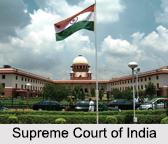 Indian Law System demotes to the system of law in modern India. It preserves a mix lawful system with a combination of civil, common law and regular or religious law within the legal structure. It is inherited from the regal era and a variety of legislation first introduced by the British are still in effect in modified forms at the moment.
Indian Law System demotes to the system of law in modern India. It preserves a mix lawful system with a combination of civil, common law and regular or religious law within the legal structure. It is inherited from the regal era and a variety of legislation first introduced by the British are still in effect in modified forms at the moment.
Types of Indian Law System
Following are the different kinds of Indian Law System:
Criminal Law: In February 2011, the Supreme Court of India ruled that criminal defendants have a legitimate right to advice. The Indian Penal Code prepared by the British in 1860 forms the back of criminal law in India. The Code of Criminal Procedure, 1973 administers the technical aspects of the criminal law. The last implementation was performed on February 28, 2017.
Labour Law: Indian labour law are amongst the most inclusive in the world. In practice, there is a big unofficial division of workers, between 80 percent or 90 percent of the labour force, to whom labour rights are not essentially accessible and laws are not implemented.
Rent Law: These laws are rather recent. They legalize the relationship between landlords and give a variety of rights to a landlord as well as renter. Every State in India has its own rental fee law.
Company Law: The current Indian company law was updated and codified in the Companies Act of 2013. One day company registration in India is not possible as it is necessary to show certain documents, preparation of which takes time.
Contract Law: It administers entrance into contract, and effects of breach of contract. The major contract law in India is codified in the Indian Contract Act, which came into effect on 1st September 1872 and expands to all India apart from the state of Jammu and Kashmir.
Tort Law: This law covers custodial deaths, police atrocities, encounter killings, illegal custody and desertions. Tort is break of some autonomous duty of contract which has caused damage to the petitioner giving rise to civil cause of action.
Tax Law: Income Tax is imposed by the Central Government under the Income Tax Act 1961. An important control on this law is Article 265 of the Constitution which states that "No tax shall be imposed or collected apart from by the right of law." The major tax ratification is the Income Tax Act of 1961 passed by the Parliament, which institutes and governs the taxation of the incomes of individuals and corporations. Goods and Services Tax (GST) is a complete indirect tax on manufacture, sale and expenditure of goods and services all over India to replace taxes imposed by the central and state governments.
 Trust Law: It extends to the whole of India apart from the state of Jammu and Kashmir and Andaman and Nicobar Islands. Trust law in India is mostly codified in the Indian Trusts Act of 1882, which came into power on March 1, 1882.
Trust Law: It extends to the whole of India apart from the state of Jammu and Kashmir and Andaman and Nicobar Islands. Trust law in India is mostly codified in the Indian Trusts Act of 1882, which came into power on March 1, 1882.
Nationality Law: Nationality law or citizenship law is chiefly codified in the constitution of India and the Citizenship Act of 1955. Even though the Constitution of India bars numerous citizenships, Parliament of India had passed a law creating a new form of very limited dual nationality called Overseas Citizenship of India on 7th January 2004. Abroad citizens of India have no variety of political rights in the government.
Family Law: Family laws in India are different when Warren Hastings in 1772 created provisions prescribing Hindu law for Hindus and Islamic law for Muslims. Recent improvement has affected safekeeping and guardianship laws, adoption laws, succession law, and laws concerning domestic violence and child marriage.
Intellectual Property Law: These laws have been endorsed to look after and promote intellectual property. The laws for intellectual properties are - trademarks Act, copyrights Act, geographical indications Act.
Cyber Law: Cyber liberty is an important characteristic of modern times and as such information technology Act has been performed which provides principles applicable to online transactions and many more.
Civil Law: Indian civil law is composite, with each religion having its own detailed laws to go after. After independence Indian laws are changing according to the modern world. Civil issues like murder, physical attack, physical injury, economic offences, medical disregard, drugs/ narcotics, aggravation, sexual abuse, domestic violence, corruption, extortion, cheating, colonization, human rights violation, and more come under civil law.
Common Law: It is also known as case law. A "common law system" is an authorized system that gives huge precedential weight to common law system. It is a body of law derived from judicial decisions as separate from statutes.




















